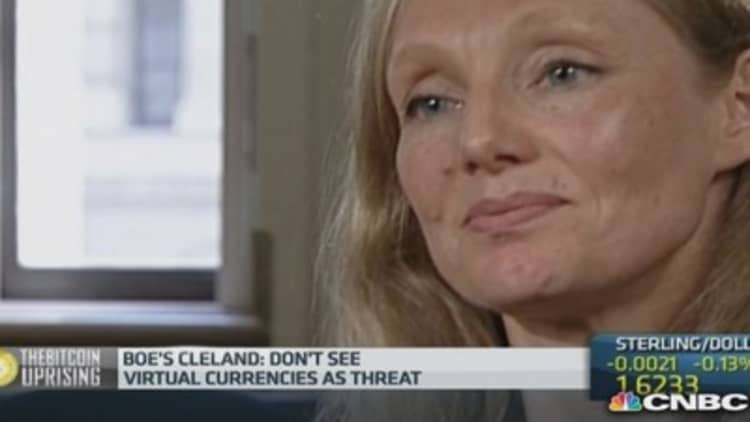There can't be many financial instruments that have generated intense debate and scare stories over the past year than digital currencies such as bitcoin.
This month, Bank of England (BoE) weighed into the debate, publishing a major new piece of research. Ever since academics and experts have been poring over the report, especially its warning that cryptocurrencies could pose a threat to financial stability.
The BoE pays particular attention to bitcoin. Like other virtual currencies, it allows users to exchange online credits for goods and services and can be created by using a computer to complete difficult tasks, a process known as mining.
While it believes bitcoin doesn't currently pose a material risk, mainly due to its limited use, the bank warns that it is possible to conceive the risks that may develop over time as it gains in popularity and if no controls are in place.
Read More Bank of England: Bitcoin could transform stock markets
CNBC highlights the three key areas that the BoE believes could pose a threat with well-known voices in the industry adding to the argument.
Crash contagion
The BoE suggests that "marked increases" in price could mean that a price crash might have greater impact. A chart showing the price of bitcoin since its inception in 2010 makes for some scary reading. Critics have likened it to the Dutch "tulip fever" of 17th century but advocates expect this to iron itself out as liquidity and volume increase over time.
"Anyone who has been following bitcoin would probably agree with the BoE that a future bitcoin price crash is not only conceivable but probable," Garrick Hileman, an economic historian at the London School of Economics, told CNBC via email.
Read MoreWhat is bitcoin?
"A more interesting bitcoin price observation, which the Old Lady of Threadneedle Street fails to mention, is that the severity of bitcoin price crashes appears to be lessening."
But the BoE concedes that a crash would be fairly limited to the holders of the digital currency, adding that it would only really cause genuine fear if derivatives came into play or "systemically important" financial institutions had an unhedged position. In February this year, Wall Street's Fortress Investment Group reported a $3.7 million in unrealized losses on bitcoin during the previous year. While this might not be a significant institution like the BoE details, it shows the willingness for some players to take major positions on the cryptocurrency.
Zennon Kapron, the managing director of financial consulting and research firm Kapron Asia believes that derivatives based on bitcoin's open source technology could potentially provide more clarity than traditional financial derivatives as each underlying risk in each asset could be more easily broken down to its individual parts.
System-wide fraud
The U.K.'s central bank is also concerned that system-wide fraud could appear with one or more miners taking control of payments by gaining a majority holding of the currency. This is known as the "51 percent attack" issue, and is a well-known problem in the bitcoin community, according to Bobby Lee, the CEO of prominent Chinese bitcoin exchange BTC China.
Read MoreIs Apple Pay a bitcoin killer?

"The consensus is that it would not make economic sense to conduct fraud using a 51 percent attack," Lee told CNBC via email.
Jon Matonis, the executive director of the Bitcoin Foundation, which aims to promote and protect the cryptocurrency, explains that as bitcoin miners are incentivized then they would participate honestly rather than manipulate a system which would only grant "limited" capabilities. He adds that it would be disruptive but not fatal and there would be ways for the bitcoin community to rapidly correct the issue within a short space of time.
Read More Bitcoin key to future of online payments: EBay CEO
"It's a lot of money to spend for approx 10 minutes of temporary and potentially limited 'fraud'," he told CNBC.
Fractional reserve banking
This is already a familiar banking practice -- whereby a lender only holds reserves to satisfy the demands for withdrawals and are less than the amount of total customer deposits. But used in the world of bitcoin, this could put national financial stability at risk if unregulated, according to the Bank of England, due to the possibility of what it describes as "bank runs."
BTC China's Bobby Lee believes that this is indeed a possibility if these institutions misbehave but advocates "moderate and appropriate" regulation which should help consumer protection, and minimize fraud and bad behavior.
Meanwhile, Matonis says that it is debateable whether fractional reserve banking is even a possible with cryptocurrencies. The transparency of the technology behind bitcoin would mean that customers would be aware of overissuance, he said.





